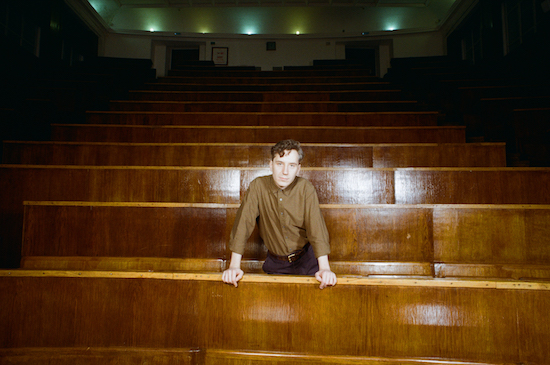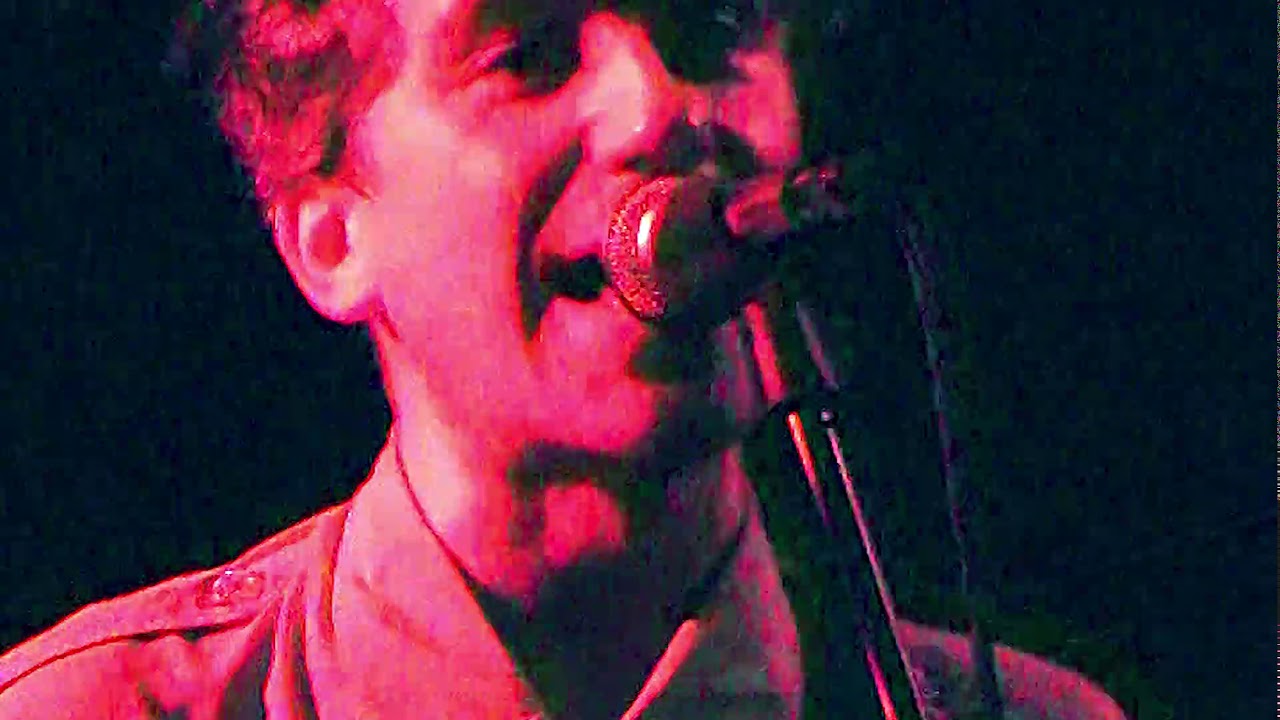Inturist portraits by Talib Shillaev
However modest or unassuming he may be in company, Yevgeni (Jenya) Gorbunov is a remarkable man. A ‘veteran pop star’ in his mid-thirties, and a serial musical collaborator, connector and inspirer, Gorbunov has been a key figure in Russia’s alternative music scene over the last decade. He was first known as a guiding light in two wildly popular bands, NRKTK and Stoned Boys. And a while later, for his collaboration with Andrew Lee as Interchain on his and Lee’s Incompetence label; which made thumping hybrids of Detroit House and stripped down, punky rave. As well as making some tremendous mixes of contemporary Russian music, he is also known for his interest in design, animation and propaganda, and releases a monthly newsletter, which reveals his fascination with Gorbachev-era Russia, right down to the typeface.
Currently there are two acts that Gorbunov is associated with; гш / Glintshake, which he co-pilots with the brilliant singer, guitarist and polymath Ekaterina Shilonosova – aka Kate NV – and Inturist. гш / Glintshake have rocketed from an enjoyably scruffy slacker rock band to a tough, Russian-speaking behemoth whose deft reworkings of experimental jazz, psychedelic rock, post-punk and Russian avant-garde ideas creates a very potent stew. Their last LP, 2018’s Польза (‘Benefit’) was a whirlwind of clashing guitars, killer rhythms and cutting observations of Moscow’s social and cultural life.
His latest project Интурист / Inturist is a fascinating idea, a musical take on the social absurdisme found in, say, a Bruno Schwartz story. That Inturist mix the juiciest licks found in Aksak Maboul, Gong, Dome and Rip, Rig + Panic with the best in 80s Russian pop is also a major plus. Two albums are already out: 2018’s Командировка (‘Business Trip’) and 2019’s Экономика (‘Ekonomika’), which, though brilliant, are as rare as hens’ teeth in terms of physical product; certainly for those outside of Moscow. The releases plot a story, a seemingly post-post-Soviet, and very Muscovite update on Gong’s flying teapot saga. Gorbunov: “It’s about a guy who is never really awake during his working life, and suddenly finds that everything isn’t what it seems. Everything around him is weird and has its own life.” Last year’s LP charted a business flight our hero undertook, and part two is where he is thrown into the current economic funfair of the Russian Federation.
The project can take the form of a floating collective, harnessing the formidable talents of Playtronica drummer Viktor Glazunov, bassist Dima Midborn (of the very popular alt-pop act On-The-Go) and sax monster Sergei Khramtcevich of jazz cat organisations ТОПОТ and THE RIG. These links to Moscow’s already mythical alt-jazz scene are vital, as they give an essential fluidity and inner space to the two records.
And as a live act Inturist also takes many forms, a solo act, a full band or an impromptu menage of whoever is around to take on a particular instrumental duty. I’ve even seen Inturist playing without Jenya, at the second Station Narva festival, where Gorbunov (due to an ongoing misunderstanding over a visa) was barred entry. Drummer Viktor didn’t make the border cut either. Midborn and Khramtcevich ploughed on regardless, mixing heavy Moscow jazz licks, Midborn’s solo stuff, and Inturist numbers to startling effect. Gorbunov, of course, relished in the Spinal Tap-esque irony of not playing his own band’s concert. “I heard it was beautiful, a great gig, it’s probably better I missed it!” Jenya loves the absurdisme of life.
Gorbunov recently booked a week at WORM Sound Studios and packed in three gigs at the legendary Amsterdam punk fortress OCCII, WORM, and his Dutch debut at Le Mini Who? In Utrecht (the day programme of the Le Guess Who?) The situation presented a chance to record a running conversation with an inspirational musician who rarely ventures over the Russian border. This interview then is the result of a week of exchanges, in the WORM studio, my house in Rotterdam, traipsing between gigs, online, or happily settled with the odd glass of oude jenever and a fresh herring in the choicest bruin cafés in Rotterdam and Leiden.
You like studios. Why did you come to WORM Sound Studios in Rotterdam?
Jenya Gorbunov: Any interesting room interests me. This room for example doesn’t have to have technical perfection, but it has a lot of atmosphere. Even this wall (made of iron cladding from Rotterdam’s docks) is more interesting to me than the equipment. Even if I only have a microphone and a looper, I can make an album. Wherever I am.
For me this whole place, WORM, is a concentration of coolness. [Laughs] There are a lot of great things in one place. And I love how it all looks. Because style is very important for me. Style is very much appreciated in my world. Look at this place, the iron walls of the studio, this is a very interesting design idea.
Yet you like photographing big piles of bricks and industrial or builders waste! Your Instagram always has these pictures.
JG: Aha! That comes from a few years ago, over a number of summers in a row when Moscow’s municipal government repaired the city centre streets, and going out on the streets was like hell. You couldn’t bike anywhere, you couldn’t walk in a straight direction. There were a lot of barriers and you were often lost in a labyrinth of fences. And me and Kate [Shilonosova] just found it beautiful because these piles of bricks and sand and pipes, they were all like abstract sculptures. Everybody hated it but we found something beautiful in it.
One of the most important things that influences us, in both good and bad ways in Russia, is ugly design. The history of ugly design begins with the start of commercial activity after the end of the Soviet Union. Look at this picture for instance, where people try to sell and buy vouchers certifying the right of its owner to a share in state ownership!
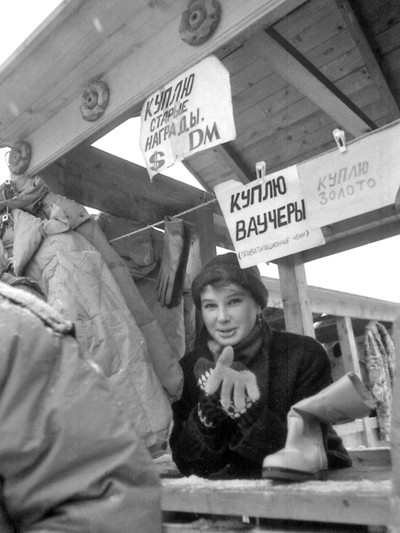
You can see that letters are not ugly, and you can feel the long Soviet poster tradition behind this lettering. And here is some more nice lettering, from 1992.
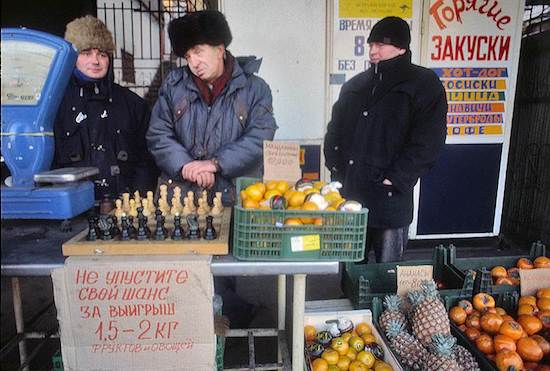
The guys in this picture are challenging you to play chess to win a few kilos of vegetables or fruit. The letters on the background say things like, “hot dogs and pizza”. But this style is really old school. I think the real trash began when people started to use technical equipment like Xerox, or some primitive computers. I make a newsletter on my Instagram where I use the beautiful fonts that everyone knew during Gorbachev’s time.
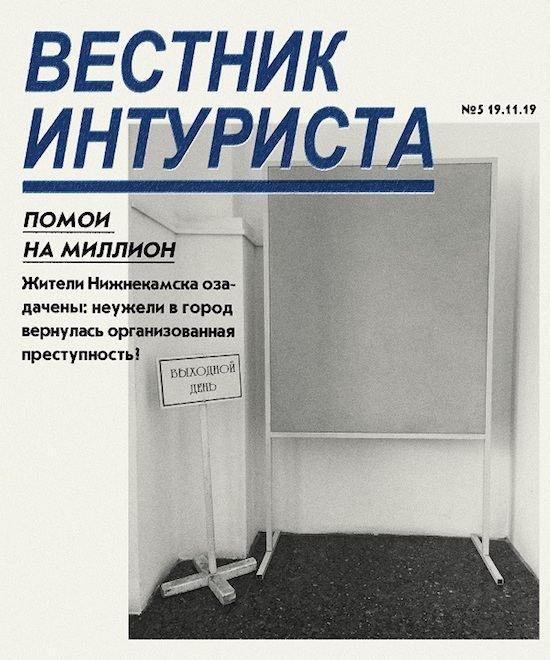
In the middle of the 90s there were a lot of trade stands in Russia (called Laryok), they were everywhere and they looked really ugly.
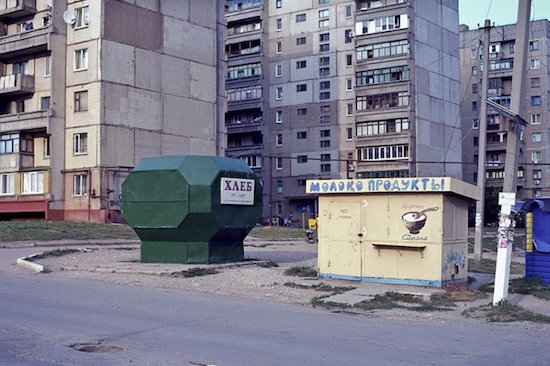
As you can see there’s no Soviet tradition of design anymore, only business in its ugliest guise. Then another new style was born, later in the 90s; non-professional, bright and bold.
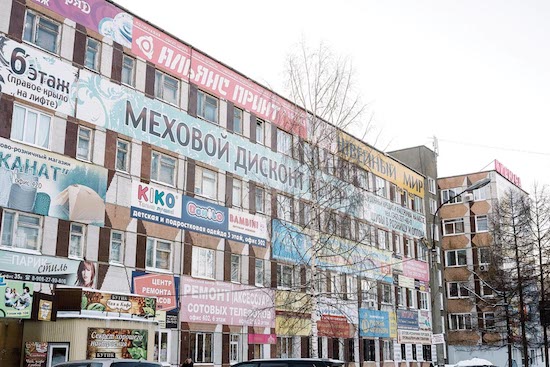
There was a lot of ugly advertising on Moscow’s streets but now the guys in charge are busy destroying this “infection”. As you saw, Moscow now looks nice. But there’s still a lot of this kind of stuff in other cities and it looks like a disease. These ugly visuals influenced us so much as гш / Glintshake and Inturist, they came right from the depths of the traumatized Russian soul, like an acne on the skin of a teenager who has to get past a difficult age.
What is your idea of personal style? It seems a lot of the current crop of Russian musicians have a strong visual aesthetic.
JG: Ach, I dunno. When I select what I am going to wear I try to wear things that don’t show me for something I’m not. I like timeless things. I don’t want to be part of only “now”. I want to be outside of all things. I want to wear clothes and have an image that reflects that.
Your music is very observant. Everything I hear from you feels as if you are from the outside looking at something.
JG: Yes that’s true. Because when you’re inside you start to play in someone else’s rules. When you’re outside you don’t have to do anything but what you want. I enjoyed walking round the place I played that Sunday in Utrecht, just looking at all the crazy people and music, just taking everything in. That is enough for me.
You said to me earlier – when we were talking about Shortparis and how abrasive they can be – that you were pensive, because you “only make beautiful music”. That sometimes the thought that everyone would say, “Ah, Inturist is such nice music” made you feel a bit sad! But your music is beautiful, in the sense that it’s always very carefully and tastefully presented. Even when you deconstruct it. There is a sense of grace in your music. It’s almost painter’s music.
JG: Maybe. I almost always feel my music like colours and shapes. I dunno… [Laughs] It’s not a big deal. I like Shortparis for the way they get people talking. It’s very good. And for my music, I think I make records like I would make a sculpture. What I do in the studio is work with the raw material, nothing more. Then comes a long process.
When I started interior design at college there was some painting and drawing included, and we learnt the main rules of synthesis and anti synthesis. From concentrating on the whole to working on details and then back to the whole thing again. I think this process works for music.
But your music is not cold music, if anything quite the reverse.
JG: You’re right but it’s like… I am not so emotional when I am actually doing it. It’s as if your emotions are very silent when you create. And the head doesn’t control everything. There is a lot of intuition but I need a quiet mind. The process is a bit like meditation. I know when and where I need to add the craziness.
Tell me about how you balance your taste for the absurd and your serious side.
JG: I think people are not too serious on the whole. Though in Russia they are as serious as they need to be. [Laughs] But I really love to observe, you are right. And sometimes I love watching absurd situations. And also Moscow can inspire but then, in Russia, I think I know why everything is the way it is (socially). Why for example why a shop has certain style of ugly LED lettering, why a font is used, I know this from the strange kind of social cultures Moscow and Russia creates. But here in Rotterdam I look at a lot of very intelligent things and a very clean city and amazing views, and it’s very cool, but I wonder… how can this inspire me? There is no absurdisme here.
There is certainly a tough and dark side to this city. Many just see the facade.
JG: I know! Yesterday I crossed that twisted bridge [the Erasmusbrug that spans the Maas] and I nearly got in a fight with a guy who got really pissed off that I took pictures. He turned to me and gave me the finger. He told me to get out of Rotterdam! [Laughs] But that was good, it showed that it was a real place with real people.
Tell me about this new record, Экономика, it’s the second Inturist record isn’t it? You have this signature style that draws on Fripp, David Byrne, Eno, Aksak Maboul, lots of arty 80s sounds.
JG: I suppose I do, though I was a little bit afraid that this new record would lose some of the aesthetic of the first record. It was played like a live LP, and it was played so great by the band, nearly in one take, but I was scared it would be too poppy in comparison with the first, which is a pretty intense record. On Командировка, the lyrical hero, he’s just in a dream, he’s nowhere and he’s in a strange existence when you don’t control anything. And that record sounded just like that feeling. In Экономика the guy wakes up and realises he’s missed almost everything, and he needs to sort out things very quickly. But he’s in the crazy city.. Moscow! Ha! The records are like a diptych. A question and answer story. I really love the way the second sounds. But they are different.
Tell me about you using your voice as an instrument live on stage, which you seem to be doing more of now. You did this at Utrecht’s Le Mini Who where you sampled your voice for the rhythm and main melodies and then used the guitar as the counterpoint.
JG: I try to do something in my live performance because I miss it in the music. I want musicians to do something for me so I can listen.
And your live performances can be very very dreamy, otherworldly. You seem somewhere else.
JG: I think live performance should be like a journey. And I am always trying to make it like that [Laughs] For me the perfect performance is like being in a David Lynch movie, where everything is ok, but a little bit weird. Normal things in strange situations.
I was at Le Guess Who? last year and I saw the performance of Ka Baird and Pekka Airaksinen and it was a huge moment for me. I really appreciate it when I see a real person onstage. It’s so great for my understanding of their music. Because sometimes musicians just hide behind the material. They know what they need to play and they represent it because they are onstage and they need to play their songs. But she was like the music itself. All that she did, all her sounds and movements, they were like proof of her human power. She was so powerful and with so much energy. And what she made was happening in the music, in that moment! I loved the sounds she made with her voice. And how it tied into her moves and gestures.
Let’s talk about Russian music more generally. We were once talking about Lermontov’s book A Hero Of Our Time and we started having a minor argument about his character Pechorin, and you suddenly said, “Ah, remember Russia is half Europe half Asia, this is what we feel”, and that stayed with me. I subsequently thought, this is also maybe how Russian music operates, it looks two ways but rubs along together.
JG: I got the feeling of this remark when I was in China. I travelled by train through China and listened to Russian music like Rakmaninov or Prokofiev all the time. And it all felt very right for that place. It was as if I was in “maximum Asia”! [Laughs] And I felt these Asian notes in Russian music when I was in that situation. It’s not only notes but feeling, a feeling of space, how melody reveals itself. Because the melody can be very wide, huge.
So you mean you can’t see the end of the melody?
JG: Yeah! Western music is more like it’s specifically focused on something. It’s very concentrated on certain points and it often builds everything around one idea. But Russian music sometimes shows you a very wide picture. It’s like you are sitting in the first row in the cinema. And you look up at the screen. You know Prokofiev is so great, lots of people don’t like him but to me he is great pop music; his melodies are brilliant. I love his piano concertos, they are just genius.
[At the beginning of the WORM show, the tipped-off soundman slips on the opening bars to the first movement of Prokofiev’s magnificent 5th Symphony. Jenya stands to attention, stock still, almost sucking in the notes before embarking on a wild show full of stomps, dances and yelps.]
Maybe there’s a link here to the music you’re making in WORM’s Sound Studio. I see you’ve spent a lot of time playing on the KORG mini synth, putting your guitar through it. And you said to me it was making some crazy sounds.
JG: It was interesting to use it, because I found out that it made some unpredictable sounds when you play two notes at once, as it can’t understand what note is playing. It only understands one note. When you take two notes it tries to find one and starts to make unpredictable noises. And I love it in music, when something starts to be unpredictable. It’s so much fun when you listen to your guitar in one channel and the stuff from the KORG in the other, and realise they are trying to play the same things but can’t! It’s very cool.You can make a whole record of this stuff! It’s always funny when you find something new with your main instrument, such as my guitar.
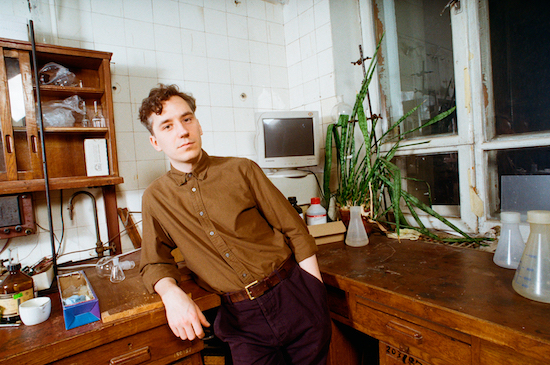
[Gorbunov likes strange architecture, and since there is plenty of that in the Netherlands, he indulges in the ugly beauty of 80s-90s Dutch municipal buildings. He also loves older technology and begged to be photographed next to some PCs backstage in OCCII, proof, he tells me, of the “top class business office” of his hero in the two Inturist albums. He also likes quiet old pubs, places where he can sit and ponder the absurdisme of the world. Apparently there are not the desired number in Moscow. On the way to one in Leiden (where happily there are many), we pass the Leiden University Medical Centre where a strange link with contemporary Russia has been formed, via a piece of public art that looks like a cross between a tuskless walrus and a rather staid old gent. It is called Homunculus Loxodontus, and is made by the young Dutch sculptor Margriet van Breevoort. In Russia this statue goes by the name of ЖДУН (‘Zhdun’) ‘A Waiter’. When we enter the hospital lobby we find the statue is on tour, replaced by another of van Breevoort’s works, a similarly weird hybrid made in the same rubbery material, this time a car crash between a unicorn, seal and what could be a humanoid jackal. Both statues clear examples of Gorbunov’s absurdisme in action? Apparently not.]
JG: I don’t really care much about Zhdun. I see it a lot in Moscow. It’s crazy how a statue in Leiden becomes a huge meme in Russia. There are bars in Moscow with Zhdun in and people think it’s cool but I normally avoid them. These places are too loud anyway and they are too bad taste. And this artist, both her sculptures, Zhdun and this, are weird. Look, these animals cannot walk. This is a bit cruel, don’t you think? They have no real legs.

[Jenya consents to be photographed with the new work, but some time in the pub is needed to recover equilibrium. Maybe the “crazy city” has made its presence felt some fifteen hundred miles away in sleepy Leiden. Once in the pub, armed with cheese and oude jenever, things pick up.]
JG: I love old pubs because they often have no music. Or it is quiet enough to hear the talking. I love hearing the rhythm of talk, and I hate pubs with music, because, well, I just can’t ignore music! How can I? And worse, modern music in pubs is [and here the normally charming Gorbonov looks about wildly] so fucking BAD!
But a sleepy pub in Leiden is still not as crazy as Moscow though?
JG: No… [Laughs] The craziness of Moscow is in the concentration of people from all the ex Soviet Socialist Republics, a lot of money, and all the power corruption and lies that go with this situation. And the people in the city bring an intense energy. You just wake up in the morning and you feel like you’ve missed everything!
I suppose the new album is about that feeling.

